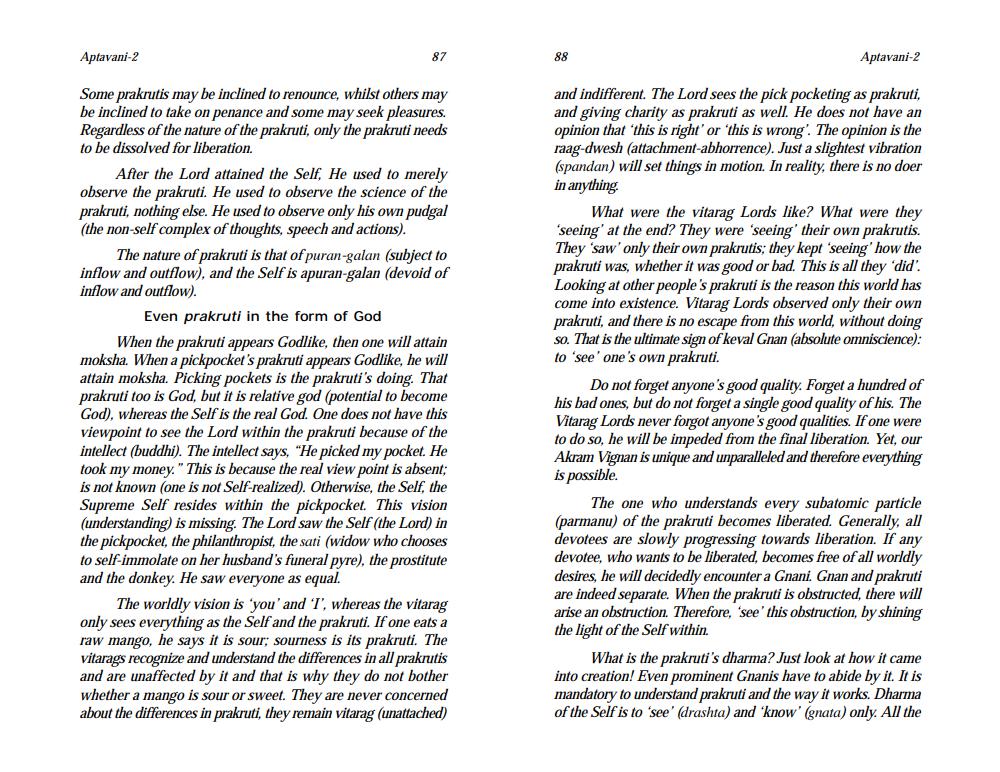________________
Aptavani-2
Some prakrutis may be inclined to renounce, whilst others may be inclined to take on penance and some may seek pleasures. Regardless of the nature of the prakruti, only the prakruti needs to be dissolved for liberation.
87
After the Lord attained the Self, He used to merely observe the prakruti. He used to observe the science of the prakruti, nothing else. He used to observe only his own pudgal (the non-self complex of thoughts, speech and actions).
The nature of prakruti is that of puran-galan (subject to inflow and outflow), and the Self is apuran-galan (devoid of inflow and outflow).
Even prakruti in the form of God
When the prakruti appears Godlike, then one will attain moksha. When a pickpocket's prakruti appears Godlike, he will attain moksha. Picking pockets is the prakruti's doing. That prakruti too is God, but it is relative god (potential to become God), whereas the Self is the real God. One does not have this viewpoint to see the Lord within the prakruti because of the intellect (buddhi). The intellect says, "He picked my pocket. He took my money." This is because the real view point is absent; is not known (one is not Self-realized). Otherwise, the Self, the Supreme Self resides within the pickpocket. This vision (understanding) is missing. The Lord saw the Self (the Lord) in the pickpocket, the philanthropist, the sati (widow who chooses to self-immolate on her husband's funeral pyre), the prostitute and the donkey. He saw everyone as equal.
The worldly vision is 'you' and 'T', whereas the vitarag only sees everything as the Self and the prakruti. If one eats a raw mango, he says it is sour; sourness is its prakruti. The vitarags recognize and understand the differences in all prakrutis and are unaffected by it and that is why they do not bother whether a mango is sour or sweet. They are never concerned about the differences in prakruti, they remain vitarag (unattached)
88
Aptavani-2
and indifferent. The Lord sees the pick pocketing as prakruti, and giving charity as prakruti as well. He does not have an opinion that 'this is right' or 'this is wrong'. The opinion is the raag-dwesh (attachment-abhorrence). Just a slightest vibration (spandan) will set things in motion. In reality, there is no doer in anything.
What were the vitarag Lords like? What were they 'seeing' at the end? They were 'seeing' their own prakrutis. They 'saw' only their own prakrutis; they kept 'seeing' how the prakruti was, whether it was good or bad. This is all they 'did'. Looking at other people's prakruti is the reason this world has come into existence. Vitarag Lords observed only their own prakruti, and there is no escape from this world, without doing so. That is the ultimate sign of keval Gnan (absolute omniscience): to 'see' one's own prakruti.
Do not forget anyone's good quality. Forget a hundred of his bad ones, but do not forget a single good quality of his. The Vitarag Lords never forgot anyone's good qualities. If one were to do so, he will be impeded from the final liberation. Yet, our Akram Vignan is unique and unparalleled and therefore everything is possible.
The one who understands every subatomic particle (parmanu) of the prakruti becomes liberated. Generally, all devotees are slowly progressing towards liberation. If any devotee, who wants to be liberated, becomes free of all worldly desires, he will decidedly encounter a Gnani. Gnan and prakruti are indeed separate. When the prakruti is obstructed, there will arise an obstruction. Therefore, 'see' this obstruction, by shining the light of the Self within.
What is the prakruti's dharma? Just look at how it came into creation! Even prominent Gnanis have to abide by it. It is mandatory to understand prakruti and the way it works. Dharma of the Self is to 'see' (drashta) and 'know' (gnata) only. All the




